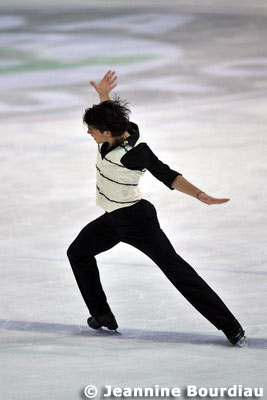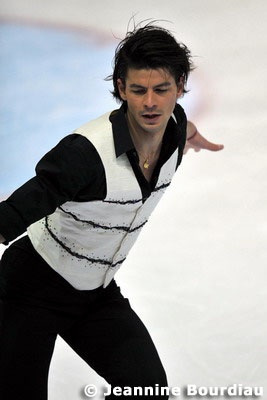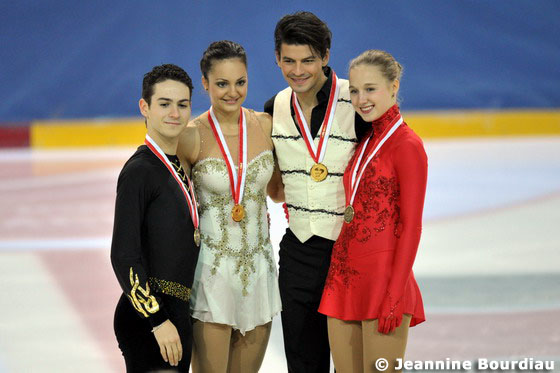St├ęphane Lambiel: "I'm strong. My heart
is there and I do everything possible
to get there"
  By Nadin Vernon
Photos © Jeannine Bourdiau
 Stéphane Lambiel regained his title as Swiss Champion at the Nationals in Lugano last weekend.
Stéphane Lambiel regained his title as Swiss Champion at the Nationals in Lugano last weekend.
While the final result wasn’t all that surprising, it was evident that these weren’t ‘just Nationals’ for the Olympic silver medalist and that being able to attend and do well at this competition, represented an important step on Team Lambiel’s journey to Vancouver.
I had a chance to catch up with Stéphane on Saturday straight after his free skate, to find out about his training schedule as well as his approach to a new situation which requires so much patience.
Congratulations on your 9th title, Stéphane. You must be very happy.
I’m happy, yes. It was good today. I’ve only really been training for the last three weeks and I wasn’t sure if I could come to this competition. But I came and I achieved my goals and am happy with both programmes. I know there are things I need to work on but I’ve got some time before Tallinn to build up that confidence again, and that will happen by spending more time on the ice.
It was a great atmosphere here with a really good crowd. We’re here to show our sport and to entertain, and I had a lot of fun out there, it felt really good. It’s been a long day for the audience but I hope that they also enjoyed themselves.
I’d like to talk to you a bit about your training, because obviously you have to approach things very differently now, not being able to train 100%.
Have you found a rhythm for yourself where you come on the ice every day and know ‘this is what I can do, this is what I can’t do’?
 I know the first 20 minutes of my skating are hard because I’m not warm enough. And to be on the ice is different than to warm up off ice. Especially in the morning, when the ice rink is cold and my body is not ready to jump. So the first jumps are always very hard.
I know the first 20 minutes of my skating are hard because I’m not warm enough. And to be on the ice is different than to warm up off ice. Especially in the morning, when the ice rink is cold and my body is not ready to jump. So the first jumps are always very hard.
My injury is under control right now. I had one month break and I could do 3 hours of physio every day. And when that month was up, we continued with a lot of physio.
We just had to set some new habits before and after practice. So before, we warm up the leg and after have treatment with ice (throughout our interview Stéphane had an ice pack on his groin), to relax the back and to let it go, so my hip can relax and doesn’t stay so tight.
So it’s kind of a new way of practice and it’s not easy, but it’s very interesting and it’s a lot about learning how to fight and how to find your way to the Olympics.
My heart is there and I do everything possible to get there.
So you know what to expect each day?
It’s not a surprise because I know the situation. And the situation is stable.
It could be worse, but right now for the last three weeks, every day was pretty much the same, the same kind of rhythm.
And I think until the Olympics, I hope, that it’s not going to get worse so I can skate every day.
You have to be very disciplined then.
Yes, it’s very strict. Every day is very strict.
How is that for you?
It’s so weird because I’m not that kind of person. I’m the type of person that just goes on the ice and I don’t want to waste time. But that’s actually not a waste of time right now. It’s very important, because if I don’t do that, I’m not going to be able to skate until the Olympics. So, it’s a very nice feeling to know that I need to find a solution and I know that my team is helping me to go through this and I’m strong. I’m strong here (points to his head), I’m strong there (points to his body) and my legs are going to be strong.
The physical pain is one thing but there’s also the mental frustration of wanting to but not being able to.
Yes, exactly. You want to and you feel the pain and sometimes, for example today, I felt so good in the air in all my jumps but all the landings were shaky. So I just feel that I’m strong enough but maybe I need more time on the ice. I need more practice. I need more trust in myself and that will come with more practice.
 You hardly did any spins in training here.
You hardly did any spins in training here.
Yes, I’m only really doing the spins in the programme. We just started spinning last Friday. I did the first two spins in my programme but I skipped the last spin.
But it’s very important to spin because after the spin you have a jump and if you don’t spin, you don’t have this feeling of rotation and you get dizzy if you don’t practice it. So I have to work on that, too.
I noticed that you have gone back to doing the spins without the change of edge, but you’re still getting Level 4s.
Yes, this season they changed the rules. Right now, if you stay in one position for eight rotations, you don’t need to change the edge. It’s one feature to get the level. So instead of doing the change of edge, I do the eight rotations.
How does the training at competition compare to training back home?
It’s pretty much the same. There are actually more skaters from a higher level here. But with my team we are doing the same. We do steps before the jumps to feel the edges and to warm my body on the ice.
I cannot skate that much at home either, so I’m used to the short practice where I need to do all my jumps in a short time.
And then you do a lot of off-ice, too.
I do a lot of off-ice, I do a lot of physio. It’s more treatment than practice actually.
Do you do all of that in the same place, that you go to the rink in the morning and stay there the whole day?
No, I have the physio in the hospital, I have my work on the ice in Geneva and then I have my off-ice in Lausanne. It’s more like first step in the morning, second in the afternoon and then third at the end of the day. It’s a lot of traveling, a lot of wasted time on the road.

Tell me a little bit about your time in Toronto. Did you get much training done while you were there?
No. It was only treatment, it was 3 hours treatment a day. But it was what I needed at that time. I probably only went on the ice five or six times.
You had a long gap today, you had the training very early in the morning and then the competition quite late in the afternoon. What did you do in between?
Yes, yesterday was also a very hard day because we started very early and had only one hour in between the training and competition. And there was also a dinner the night before, so yesterday was pretty hard, but today was ok. We did the practice in the morning, then went back to the hotel. I slept for one hour and then we went for lunch and just walked around a bit after and came here. It was a good day.
So you try to just do something relaxing before the competition?
Yes, to just stay busy. Not stay in the room and wait until the competition comes but just stay busy.
 There’s talk of a new free programme. Can you confirm that?
There’s talk of a new free programme. Can you confirm that?
I cannot confirm you that. I’m working on something. I don’t know if it’s going to happen. Right now it’s only a plan and I don’t want to say too much about it because it’s so fresh.
Why do you want to change it?
Because I always love to have something new up my sleeve. (laughs)
So you’re not fed up of the Tango?
No, no. I love to skate that programme. I feel very confident with it, but yes, I just like to work on different things. We are also working on the programmes for AOI.
Ok, so you’ve already started thinking about what you’re going to show there?
Yes, there will be two new programmes and now we’re going to work on the programme for Anastacia. I don’t like to go on the ice and just work on one thing or one programme in particular. I like to go on the ice and have a choice to work on this or that and it helps you to work on different things and not do the same every day, because you get bored.
You seem to be a skater with a very good work/life balance. There are many skaters who go to the rink in the morning and come back late at night and that’s it. Would you say that’s true and that it’s important for you to have a life outside skating?
Yes, I need that. I’m not a robot. And I love for example on the weekend, to just go home and cook with my mother and just relax and do nothing. It’s nice to have a simple life and not just skating skating skating. When I go to see my mother, she knows that I don’t want to talk about skating. Skating is my profession and it’s my business and when I’m home we talk about different things. We talk about family, about cooking, about what’s happening in the world and that’s enough. That’s good for us.
The Olympics are in two months time, does that seem too soon? My heart starts beating a whole lot faster when I think about them.
Yes, me too. Well, today it’s because of Nationals, but yes, it seems so soon. They are coming so soon.
 It’s an incredible achievement to attend your third Olympics, but things are very different this time round. With what mindset are you going into this competition?
It’s an incredible achievement to attend your third Olympics, but things are very different this time round. With what mindset are you going into this competition?
Yes, the situation is so different. I already have a medal and I don’t need to prove anything to anybody. I just need to go there and do my job. That’s what makes them special, that I’m there because I want to be there and I want to fight for it.
That’s probably the best way to look at it, to just enjoy the ride.
Yes, to enjoy it. That’s the last Olympics I’m going to do, probably.
And you don’t want to be looking back in ten years time and think ‘Why? I should have gone’.
Yes, exactly! So I’m just going to enjoy it, I’m just going to fight. And right now I’m doing everything possible to be the best at the Olympics, and to do the best performance I can do.
Thanks so much for taking time out to talk to me and best of luck for the coming weeks.




